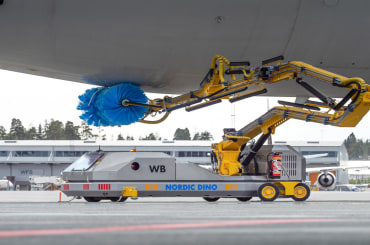
Airbus and an Australian renewable energy company have agreed to collaborate on the development of hydrogen fuel for the aviation sector.
The European planemaker signed a memorandum of understanding (MOU) with Australia’s Fortescue Future Industries (FFI) – aimed at supporting the entry-into-service of Airbus’ ZEROe hydrogen-powered aircraft by 2035 to help achieve net-zero emissions targets.
As part of the MOU, the companies are expected to study the challenges of hydrogen regulations, supply, infrastructure and fuelling for aviation, ranging from the production of hydrogen to its delivery to airports and transfer onboard aircraft.
It comes as there has been mounting pressure from consumers to shift to sustainable operations within the aviation industry, as it is responsible for 2.1 per cent of human-induced carbon emissions.
However, the slow transition into green technology for aviation has been because of the insufficient supply chain, which inevitably hike up prices and deter companies from investing.
FFI is expected to provide cost outlook and technology drivers across the supply chain, while also building infrastructure deployment scenarios for the supply of green hydrogen to targeted airports.
“The time is now for a green revolution in the aviation industry. This exciting collaboration brings together leaders in the aviation industry with leaders in green energy for a better, greener, cleaner future,” FFI founder and chairman Dr Andrew Forrest AO said.
“… People want to be able to see their friends and loved ones in other countries. They want to be able to explore new places. They want to see the world. But we also want there to be a world for the future.
“By helping to enable a greener aviation industry, we pave the way for the future generation to be able to live in this global society too, and doing so without sacrificing the planet.”
Meanwhile, Airbus has pledged to provide characteristics on fleet energy usage, scenarios for hydrogen demand in aviation, refuelling specifications and aviation regulatory framework.
“Partnerships and cross-sectoral approaches are a necessity to make zero emission aviation a reality. Airbus is preparing itself to put a zero-emission aircraft in service by 2035,” Glenn Llewellyn, Airbus VP of zero emission aircraft, said.
“But this will only be possible if we can ensure enough green hydrogen is produced worldwide and I’m thrilled to see FFI enthusiasm with regards to our ambition.”
In June last year, Airbus announced it would accelerate its development of environmentally friendly aircraft by opening two centres to test and manufacture LH2 (liquid hydrogen) tank structures.
The “Zero-Emission Development Centres (ZEDC)”, located in Bremen, Germany, and Nantes, France, are set to be operational by 2023.
This article is courtesy of Defence Connect.












